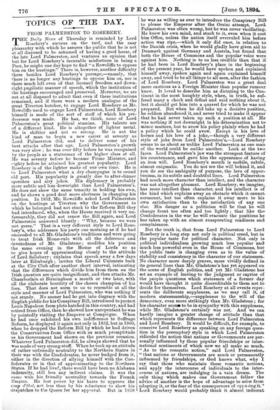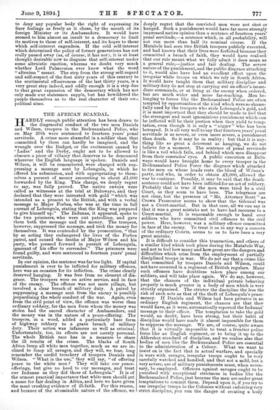TOPICS OF THE DAY.
FROM PALMERSTON TO ROSEBERY.
THE Daily News of Thursday is reminded by Lord Rosebery's success on the turf, and the easy pleasantry with which he assures the public that he is not at all disposed to be ashamed of having a good horse, of the late Lord Palmerston, and ventures an opinion that but for Lord Rosebery's incurable misfortune in being a Peer, he might one day hope to find "a Rowcliffe to oppose him on the hustings." There is, however, another difficulty there besides Lord Rosebery's peerage,—namely, that there is no longer any hustings to oppose him on, nor is there much left even of that licensed freedom and down- right pugilistic manner of speech, which the institution of the hustings encouraged and preserved. Moreover, we are not at all disposed to admit that even if these institutions remained, and if there were a modern analogue of the great Tiverton butcher, to engage Lord Rosebery as Mr. Rowcliffe used to engage Lord Palmerston, Lord Rosebery himself is made of the sort of stuff of which his pre- decessor was made. He has, we think, none of Lord Palmerston's great political stamina. His talents are of a different kind. He is altogether of lighter metal. He is shiftier and not so strong. He is not the kind of man to begin a new career at seventy as Lord Palmerston did, and to deliver some of his best attacks after that age. Lord Palmerston's growth was very slow ; he was over fifty before he was recognised by the people as a statesman of the higher class at all. He was seventy before he became Prime Minister, and eighty before he attained his greatest popularity. Lord Rosebery is of the lighter make of our own time. He is to Lord Palmerston what a dry champagne is to sound old port. His popularity is greatly due to after-dinner speeches and airy jokes. His diplomacy is probably more subtle and less downright than Lord Palmerston's. He does not show the same tenacity in holding his own, and he shows a good deal more alertness in changing his position. In 1852, Mr. Rowcliffe asked Lord Palmerston on the hustings at Tiverton why the Government to which he belonged had not stuck to the Reform Bill they had introduced, why, when the House received it very un- favourably, they did not renew the Bill again, and Lord Palmerston answered bluntly : "Why, because we were not geese." That is a very different style to Lord Rose- bery's, who addresses his party one morning as if he had succeeded to all Mr. Gladstone's traditions and were going to treat Irish Home-rule with all the deference and devotedness of Mr. Gladstone ; modifies his position the same evening in the House of Lords so as to give hopes of approximating closely to the attitude of Lord Salisbury ; explains that speech away a few days later at Edinburgh ; invites the Liberal Unionists back at the City Club after another short interval, intimating that the differences which divide him from them on the Irish question are quite insignificant, and then attacks Mr. Chamberlain at Birmingham a month or two later, with all the elaborate hostility of the chosen champion of his foes. That does not seem to us to resemble at all the style and manner of Lord Palmerston, who was nothing if not sturdy. No sooner had he got into disgrace with the English public for his Conspiracy Bill, introduced to protect Louis Napoleon from plots hatched in this country, and had retired from Office, than he showed how unrepentant he was by pointedly visiting the Emperor at Compiegne. When he had once exhibited his own indifference to Suffrage Reform, he displayed it again not only in 1852, but in 1860, when he dropped the Reform Bill by which he had driven the Conservatives from Office with as much promptitude WI his Government had shown on the previous occasion. Whatever Lord Palmerston did, he always showed that be Was made of very strong stuff. When he took up an attitude of rather unfriendly neutrality to the Northern States in their war with the Confederates, he never budged from it, either in the direction of allying himself with the Con- federates or in that of approximating to the Northern States. If he had lived, there would have been no Alabama indemnity, still less any indirect claims. It was the same with his friendly neutrality towards the French Empire. He lost power by his haste to approve the coup d'etat, not less than by his reluctance to show his despatches to Vie Queen for her approval. But in 1858 he was as willing as ever to introduce the Conspiracy Bill to please the Emperor after the Orsini attempt. Lord_ Palmerston was often wrong, but he was never vacillating. He knew his own mind, and stuck to it, even when it cost him Office, unless the nation itself overruled him before action was ripe,—which it only did once, in relation to' the Danish crisis, when he would gladly have given aid to Denmark against Germany and Austria, but found that both the House of Commons and, the popular voice were against him. Nothing is to us less credible than that if.
he had been in Lord Rosebery's place in the beginning of the present year, he would have spoken and explained himself away, spoken again and again explained himself away, and tried to be all things to all men, after the fashion. of Lord Rosebery. Lord Palmerston was a great deal more cautious as a Foreign Minister than popular rumour knew. It loved to describe hint as dictating to the Con- tinent in the most haughty style, when, in truth, he suf- fered many a check and defeat and said nothing about it, lest it should get him into a quarrel for which he was not prepared. But when he did take up a decisive position,, he seldom abandoned it, and never tried to make it appear' that he had never taken up such a position at all. He was nothing if not downright in his determination not to' mince matters, but to avow his policy plainly when he had a policy which he could avow. Except in his love of horses and his love of a joke,—though a very different style of joke from Lord Palmerston's,—Lord Rosebery- seems to us about as unlike Lord Palmerston as one man. of the world could be unlike another. Look at the two. faces. Lord Palmerston's jaw was the strongest feature of his countenance, and gave him the appearance of having an iron will. Lord Rosebery's mouth is mobile, subtle, almost enigmatic. You do not see the will behind it, and you do see the ambiguity of purpose, the love of oppor- tunism, in its subtle and doubtful lines. Lord Palmerston had much more character than intellect, and the character was not altogether pleasant. Lord Rosebery, we imagine,, has more intellect than character, and his intellect is or the kind which explains away an obstacle which it cannot. surmount, but too often explains it away more to his own satisfaction than to the satisfaction of any one else. His danger as a politician will be that he will change front too often and too lightly ; that like the- Confederates in the war he will evacuate the positions he has taken up with an almost exasperating readiness and complaisance.
But the truth is, that from Lord Palmerston to Lord Rosebery is a long step not only in political creed, but in the popular taste for political character. Not only is. political individualism growing much less popular and much less powerful even in the House of Commons, but the public taste is changing even as to the value of stability and consistency in the character of our statesmen.. No character more deeply graven, more vividly defined in its general lines than Mr. Gladstone's has yet appeared on the scene of English politics, and yet Mr. Gladstone has set an example of leaving to the judgment or caprice of the people questions which statesmen of a former day would have thought it quite discreditable to them not to decide for themselves. Lord Rosebery at all events repre- sents the deliberate suppleness, as we may call it, of modern statesmanship,—suppleness to the will of the democracy, even more strikingly than Mr. Gladstone ; for his character seem* to be in sympathy with this suppleness, while Mr. Gladstone's certainly was not. And we can hardly imagine a greater change of attitude than that which represents the difference between Lord Palmerston and Lord Rosebery. It would be difficult, for example, to conceive Lord Rosebery as speaking on any foreign ques- tion in the peremptory style in which Lord Palmerston ridiculed the notion that natio,ns or Governments are per- sonally influenced by those popular friendships or inter- national sentiments of which now we all make so much. "As to the romantic notion," said Lord Palmerston,. "that nations or Governments are much or permanently influenced by friendships, or God knows what, why I say that those who maintain these romantic notions, and apply the intercourse of individuals to the inter- course of nations, are indulging in a vain dream. The only thing which makes one Government follow the advice of another is the hope of advantage to ari3e from adopting it, or the fear of the consequences of op i oiing Lord Rosebery would probably think it almost indecent to deny any popular body the right of expressing its finer feelings as freely as it chose, by the mouth of its foreign Minister or its Ambassadors. It would have seemed to him almost an insult to a democracy to limit its motives to those of self-interest, and its hopes to those which self-interest engenders. If the cold self-interest which determined the policy of former generations has not really passed away (as, of course, it has not), it is at least thought desirable now to disguise that self-interest under some altruistic emotion, whereas we doubt very much whether Lord Palmerston ever knew what the word " altruism " meant. The step from the strong self-regard and self-respect of the first sixty years of this century to the sentimental effusiveness of the last thirty years, is a very great step indeed, and oddly enough it is a step due to that great expansion of the democracy which has not only made our statesmen supple, but has bewildered the people themselves as to the real character of their own political aims.







































 Previous page
Previous page